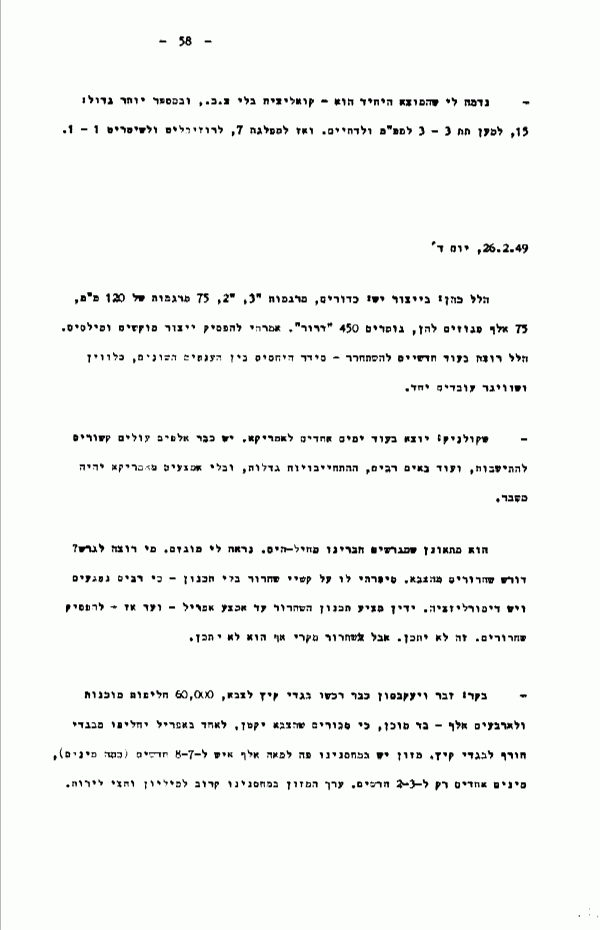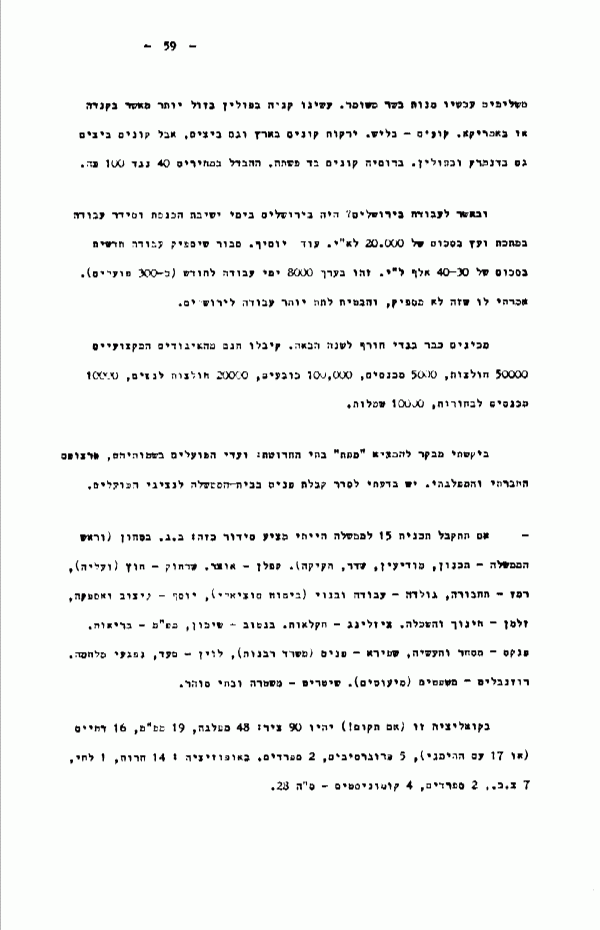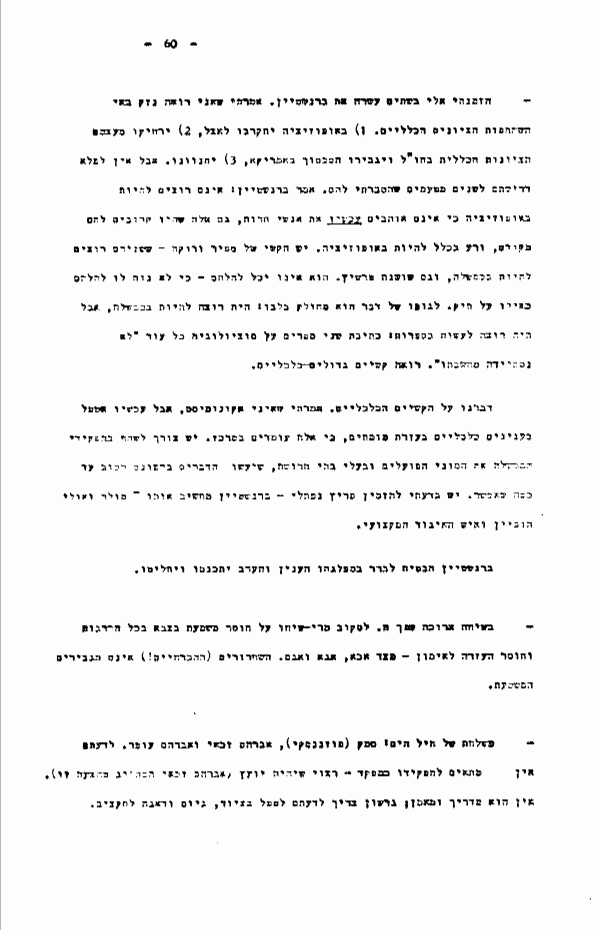1
of
Places:
United States
Canada
Jerusalem
Sa'ad
Ofer
Denmark
Poland
Russia
The use of the photograph is subject to the Copyright Law, 2007
26.02.1949
237041
Wednesday, February 26, 1949 Hillel Cohen: [The following are] in production: bullets, mortars 3”, 2”, 75 mortars of 120 mm, 75,000 shells for them, 450 “Dror” are being completed. I told him to cease production of mines and Mills. Hillel wants to step down in two months – he sorted out the relations between the various branches, Slavin and Schweiger are working together. – Skolnik: He’s leaving in a few days from America. There are already thousands of immigrants linked to settlement, and many more are coming, the commitments are many, and without means from America there will be a crisis. He complains that our members are being expelled from the Navy. This seems like an exaggeration to me. Who wants to expel [them]? He’s requesting discharges from the army. I told him about the problems of discharging [soldiers] without plans – because many encounter adversity and become demoralized. Yadin proposes planning for discharge by mid-April – and until then – to suspend discharges. This isn’t feasible. But discharging [soldiers] randomly isn’t feasible either. Becker: Zabar [Zabrasky?] and Yaakovson have already purchased summer clothing for the army, 60,000 ready uniforms and for forty thousand – readymade cloth, because they believe that the army will shrink. On April 1 they’ll switch from winter clothes to summer clothes. Our warehouses here have food for 100,000 people for 7-8 months (various sorts), a few sorts for only 2-3 months. The value of the food in our warehouses is close to 1.5 million liras. Preserved meat rations are being stocked now. We made a purchase in Poland for less than in Canada or America. [We’re] buying – in pounds sterling [?]. [We] buy vegetables in the country and also eggs, but [we] also buy eggs in Denmark and Poland. Linen is being bought in Russia. The difference in prices is 40 vs. 100 here. And what about the work in Jerusalem? He was in Jerusalem during the Knesset session and made metalworking and woodworking arrangements totaling P£ 20,000. He’ll do more. He thinks that monthly work amounting to P£ 30-40,000 will suffice. This is about 8,000 workdays per month (about 300 workers). I told him that this isn’t enough, and he promised to assign more work to Jerusalem. Winter clothing for next year is already being prepared. From the trade unions they received, free of charge, 50,000 shirts, 5,000 pants, 100,000 hats, 20,000 shirts for women, 10,000 pants for women, 10,000 dresses. I asked Becker to produce a “map” of the factories: the workers’ councils by names, their social and political-party profile. I’m thinking about organizing a reception at the government house for workers’ representatives. – If the plan for a government of 15 is accepted, I’d suggest the following arrangement: B.G. Defense (and prime minister – planning, intelligence, broadcasting [?], legislation). Kaplan – Finance. Shertok – Foreign Affairs (and Immigration), Remez – Transport, Golda – Labor and Construction (social security), Yosef – rationing and supplies, Zalman – schooling and education. Zisling – Agriculture. Bentov – Housing. Mapam – Health. Pinkas – Trade and Industry, Shapira – Interior (Ministry of the Rabbinate), Levin – Welfare, War-Afflicted. Rosenblüth – Justice (Minorities). Sheetrit – Police and Prisons. In this coalition (if it’s formed!) there will be 90 delegate[s]: 48 party, 19 Mapam, 16 Religious (or 17 with the Yemenite[s]), 5 Progressives, 2 Sephardim. In the opposition: 14 Herut, 1 LEHI, 7 G.Z., 2 Sephardim, 4 Communists – total 28. – I invited Bernstein to come see me at 12. I told him that I consider the General Zionists’ non-participation to be harmful. 1) The opposition will draw closer to ETZEL, 2) They’ll drive away the General Zionist [movement] abroad and exacerbate the dispute in America, 3) They’ll atrophy. But their demand for two [government representatives?] cannot be met for the reasons I explained to them. Bernstein said: They don’t want to be in the opposition because they don’t currently like the Herut members, even those they were close to them earlier, and in general it’s bad to be in the opposition. There’s the problem of Sapir and Rokach – that both of them want to be in the government, and so too Shoshana Persitz. He cannot fight – because he’s not comfortable seemingly fighting for a portfolio. He’s essentially divided: he’d like to be in the government, but he’d like to be involved in literature: writing two books on sociology so long as his thinking has “not yet calcified.” He sees major economic difficulties. We spoke about the economic difficulties. I told him that I’m not an economist, but I’ll now handle economic matters with help from experts, because they’re central. The government’s functions need to incorporate the working masses and factory owners, doing things out of their own goodwill to the extent possible. I’m thinking of inviting Fritz Naftali – Bernstein regards him highly – Moller [sp.] and maybe Hoofien and a trade union member. Bernstein promised to discuss the matter with his party and this evening they’ll convene and decide. – In a long conversation, H. Lakov poured his soul out regarding lack of discipline in the army across all ranks and lack of help in training – on the part of the Personnel Department, the Logistics Department, and the Operations Department. The discharges (which are crucial!) do not improve discipline. – A delegation from the Navy: Samek (Poznanski), Avraham Zakai, and Avraham Ofer. In their view P is not suited to the position of commander – he should be an advisor (Avraham Zakai distanced himself from this proposal); he isn’t an instructor or trainer; in their view Gershon should handle equipment, enlistment, and budget concerns.











